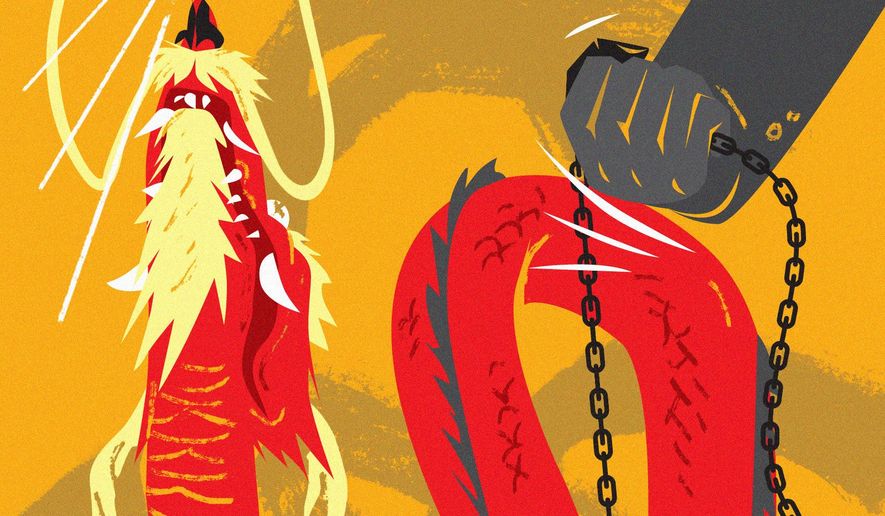OPINION:
Xi Jinping’s Chinese Communist Party is reversing key reforms of the Deng Xiaoping era. This will result in less economic growth and more popular discontent. To distract from its problems, the PRC will become more aggressive abroad and nationalistic at home. The U.S. and the Free World will need to be firm in discouraging Chinese foreign aggression.
Deng’s reforms introduced elements of capitalism in the Chinese economy: They allowed private ownership and created a level-playing-field between state-owned enterprises and private companies. They also brought elements of democracy to the CCP: After decades of Mao’s cult of personality, they mandated term-limits and collective leadership.
Deng’s reforms led to decades of exceptional economic growth and increased prosperity for the Chinese people. But they also reduced the importance of the CCP. China’s private companies have always outperformed its SOEs. Many wondered why China needed SOEs. Or the CCP.
Mr. Xi decided that the CCP’s control over Chinese society must be salvaged at any cost and started rolling back Deng’s reforms.
Mr. Xi did away with collective leadership of the CCP and assumed total control. He instituted his cult of personality and became practically ruler for life. It is now dangerous to criticize Mr. Xi, the CCP or the government.
Jack Ma’s story is telling. He is China’s most prominent entrepreneur and richest man. He was punished severely after he criticized the government last October. Chinese regulators stopped the initial public offering for Ant Group, a Ma company. At $35 billion, it would have been the world’s largest IPO. His entire business empire became the subject of regulatory review and may be dismantled. The usually flamboyant Mr. Ma disappeared from public view. He reappeared after three months in a 50-second video on rural education.
The message to China’s private companies is clear: If you oppose the CCP you lose their business. The CCP will get the blind obedience it craves. But it will also get less entrepreneurship and economic growth.
The CCP has complete control over SOEs and favors them over private companies. PRC’s banks are state-owned and they give SOEs preferential access to lending. The private sector generates over 50% of China’s GDP. In 2014, the year after Mr. Xi took power, banks lent SOEs two times more than to private companies. By 2016, the last year with comparable data, it was eight times more. Favorable lending to SOEs continues today.
This hobbles the dynamic private sector and perpetuates the underperforming state sector. It also leads to unsound loan portfolios for banks and to slower economic growth.
Mr. Xi’s CCP wants less capitalism and more communism. This will keep the CCP in power for now but will not bring prosperity to the Chinese people.
Communist economies have always underperformed capitalist ones. The comparison is most convincing when the same people work under both systems. At the time of Germany’s reunification in 1990, GDP per capita in West Germany was 1.5x greater than in East Germany. In 2019, GDP per capita was 19x greater in South Korea than in North Korea. And compared to the PRC’s, it was 2.5x greater in Taiwan and 5x greater in Hong Kong.
GDP growth is driven by growth in productivity and in the workforce. Mr. Xi’s choice of communism over capitalism is depressing productivity just as China is starting to feel the effects of a massive shrinkage in the workforce. Between 2011 and 2050, China’s working-age population will decrease from 925 million to 700 million. A comparable demographic crisis stalled Japan’s economic boom in the 1990s.
The CCP will be unable to offer its people rapid economic growth and increased prosperity as in the past. This will cause unrest. With neither economic growth nor stability to offer, the CCP will resort to nationalism. It will blame China’s troubles on foreigners who want to keep China down. And it will manufacture international conflicts to rally the Chinese people around the flag.
The United States and the Free World will need to be resolute in the face of sharper future challenges from Communist China. Global peace will only be preserved if China calculates that it would not prevail in a conflict against a united Free World. During the previous Cold War, the Soviet Union made a similar calculation. As President Reagan liked to say: “We maintain the peace through our strength; weakness only invites aggression.”
• Dan Negrea served at the Department of State as the special representative for commercial and business affairs and as a member of the secretary’s policy planning staff. A former Wall Street executive, he defected in his youth from Communist Romania.




Please read our comment policy before commenting.